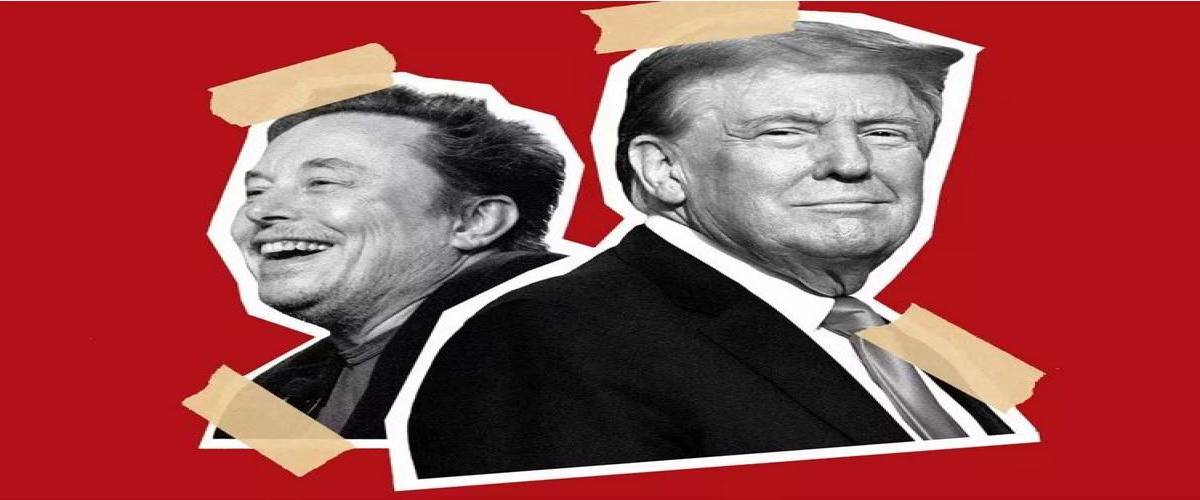969 Views
Trump & Musk’s WAR Goes Nuclear: Who Will SURVIVE the Fallout?
The unprecedented clash between Donald Trump and Elon Musk has sent a political shockwave through the United States, exposing deep ideological divides and a fierce power struggle. This battle, ignited by political disagreements, reflects broader tensions between nationalism and tech-driven globalism. The conflict threatens U.S. political stability, redefines power structures, and could impact America’s foreign policy and global standing.
Ideological Divide: Nationalism vs. Tech-Driven Globalism
The Trump-Musk feud highlights a deep ideological rift in American politics. Trump’s "America First" movement, rooted in conservative nationalism, prioritizes protectionist policies and national sovereignty, as seen in his "Big Beautiful Bill," which slashes taxes by $3.7 trillion while increasing national debt by $2.4 trillion. Musk, a tech capitalist, champions global innovation, calling the bill "a hideous and irresponsible act." This clash between Trump’s nationalist agenda and Musk’s science-driven globalism mirrors broader societal tensions, potentially fracturing political discourse and challenging America’s ability to balance tradition with technological progress.
Impact on U.S. Foreign Policy
The Trump-Musk conflict carries significant implications for U.S. foreign policy and global influence. Trump’s protectionist policies—such as tariffs and rolling back EV mandates—threaten industries reliant on international cooperation, including Tesla and SpaceX. SpaceX’s $20.9 billion in government contracts and Starlink’s $42.45 billion broadband subsidies are at risk, potentially undermining U.S. leadership in space and tech. Musk’s public criticism may embolden international actors to challenge U.S. policies, weakening America’s image of unity. The feud underscores the tension between national security and global economic interdependence, jeopardizing America’s role as a tech and diplomatic leader—creating opportunities for rival global players.
Shifting Power Alliances
The clash exposes the fragility of U.S. political coalitions. Musk’s multi-million-dollar donations to Trump’s campaign initially solidified their alliance, but disputes over fiscal policy led to a rapid collapse. Musk’s proposal for an "American Party" on X hints at a potential realignment, appealing to moderates disillusioned with traditional parties. This shift could split Republican votes, weaken party cohesion, and demonstrate how economic interests can override ideological alliances—potentially leading to a fragmented political landscape where tech and innovation drive new movements.
Economic Threats and Power Dynamics
The feud reveals the interplay of political and economic power. Trump’s threat to cancel Musk’s billion-dollar government contracts demonstrates executive leverage over private firms. Musk’s retaliatory moves—including threats to retire SpaceX’s Dragon spacecraft—showcase his economic clout. Tesla’s 14% stock plunge and Musk’s $34 billion net worth loss highlight the financial risks. This confrontation could disrupt industries, jobs, and innovation, proving how elite personal conflicts can have widespread economic consequences—harming ordinary Americans uninvolved in the feud.
Political Instability and Power Structures
The clash fuels instability by exposing cracks in America’s oligarchy. Musk’s criticism and third-party proposal could fracture the GOP, weakening its electoral prospects. The personal nature of the feud, paired with mutual economic threats, injects unpredictability into U.S. governance. This power struggle underscores billionaires’ growing influence, challenging traditional political institutions. With Musk’s wealth as leverage, the conflict may lead to a more volatile political landscape, redefining U.S. power dynamics and triggering new factional divisions.
Conclusion
The Trump-Musk feud reflects deep ideological divides and a power struggle threatening U.S. stability. The clash between Trump’s nationalism and Musk’s globalist vision—alongside shifting alliances and media battles—risks political fragmentation. Its foreign policy impact could weaken America’s global standing, while economic threats highlight corporate influence. The conflict exposes the fragility of modern political alliances, demanding balanced governance to navigate tensions in a polarized nation. Though the two are no longer at odds, the rift in America’s power structure signals deeper social, political, and economic repercussions—for the U.S. and the world.
*Translated by Ashraf Hemmati from the original Persian article written by Mohammad Esmaeilkhanian

Comment
Post a comment for this article